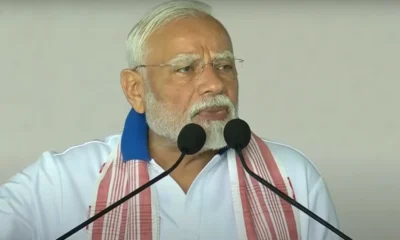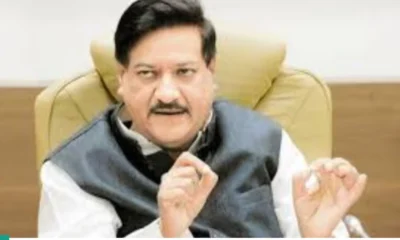On the eve of Defence Minister Nirmala Sitharaman’s visit to France and a day after Supreme Court asked Centre for details of the decision making process behind Rafale deal, a fresh storm arose over Rafale deal.
French newsportal Mediapart said it has an internal document of Dassault Aviation that says that its joint venture with Anil Ambani’s Reliance group for discharging offsets in the 36-Rafale deal was a “condition”, “imperative and obligatory” for the Rafale deal with India.
Mediapart said it had obtained an internal document which shows that Deputy Chief Executive Officer of Dassault Aviation Loïk Segalen said to his staff on May 11, 2017, during a presentation of the joint venture Dassault Reliance Aerospace Ltd (DRAL) from Nagpur: “It was imperative and obligatory for Dassault Aviation, to accept this condition, in order to obtain the export contract for Rafale from India.”
The new allegations came on a day when Defence Minister Nirmala Sitharaman was headed to France where she will visit a Dassault factory where the 36 Rafale aircraft are being manufactured for India. Sitharaman will also meet her French counterpart, Florence Parly. Sources say Dassault is likely to push for more Rafale jets to be bought by India during the Defence Minister’s three-day visit.
Dassault issued a denial in which it admitted the role of Loik Segalan, the Dassault manager who made the statement.
The statement read: “Within the framework of the September 2016 Inter-Government Agreement between France and India, Dassault Aviation has sold 36 Rafale aircraft to India. In compliance with the Indian regulations (Defence Procurement Procedure) and as frequent with such a contract, Dassault Aviation has committed to offsets in India worth 50 per cent of the value of the purchase.”
“In order to deliver some of these offsets, Dassault Aviation has decided to create a joint venture. Dassault Aviation has freely chosen to make a partnership with India’s Reliance Group. This joint venture, Dassault Reliance Aerospace Ltd (DRAL), was created February 10, 2017. Other partnerships have been signed with other companies such as BTSL, DEFSYS, Kinetic, Mahindra, Maini, SAMTEL. Other negotiations are ongoing with a hundred-odd other potential partners.”
“In compliance with French regulations, Chief Operating Officer Loïk Segalen informed, May 11, 2017, the Central Works Council of the creation of the DRAL joint-venture in order to fulfil some of the offsets commitment,” it added.
The previous Congress-led UPA government had negotiated with Dassault for 126 Rafale jets under which 18 jets were to be sent in a fly-away condition and 108 were to be assembled in India by HAL. However, the UPA could not seal the deal.
The new deal, announced by Prime Minister Narendra Modi on April 10, 2015 during his visit to Paris, led to the cancellation of the 126 aircraft deal being negotiated by the previous government and became one for purchase of 36 aircraft. The deal was signed 16 months later on September 23, 2016 in Delhi between then Defence Minister Manohar Parrikar and his French counterpart.
In this deal, Anil Ambani’s firm became Dassault’s key offset partner. As part of the offset clause, Dassault has to ensure that business worth at least half the money — Rs.30,000 crore — is generated in India. The offset obligations of the deal are to be discharged from September 2019 to September 2023, as per the contract.
Dassault has maintained that “in accordance with the policy of Make in India, Dassault Aviation has decided to make a partnership with India’s Reliance Group” and that “it is Dassault Aviation’s choice, as CEO Eric Trappier had explained in an interview”.
Segalen’s remarks back what former French President Francois Hollande, who held office when the deal for 36 Rafale aircraft was signed between India and France, had told Mediapart: “It was the Indian government that proposed this service group (Reliance), and Dassault who negotiated with Ambani. We didn’t have a choice, we took the interlocutor who was given to us.”
Hollande was responding to The Indian Express report referred to by Mediapart that Ambani’s Reliance entertainment had co-produced a French film with his partner, Julie Gayet, when India and France were negotiating the Rafale deal. “That’s why, on the other hand, this group (Reliance) did not have to give me any thanks for anything. I couldn’t even imagine that there was any connection to a film by Julie Gayet,” Hollande had said.
Hollande’s statement led to a spate of allegation and counter allegations. The opposition accused the government of ignoring the state-run defence company Hindustan Aeronautics Limited (HAL) to benefit Anil Ambani. Both the government and the industrialist have rubbished the charge.
The government had said it played “no role” and that “unnecessary controversies” were being created. Late last month, the Defence Ministry invoked “issues of conflict of interest involving persons close to the former President (Hollande)”.
The government said, “had no role in the selection of Reliance Defence as the Offset partner” and that “as per Defence Offset Guidelines, the foreign Original Equipment Manufacturer is free to select any Indian company as its offset partner”.
Ambani’s Reliance Defence became part of the offset programme of the Rs 59,000-crore Rafale deal through DRAL in which it holds a 51% stake. Dassault Aviation holds 49% stake in DRAL. In October 2017, Dassault CEO Eric Trappier had announced an investment of 100 million euros in the DRAL factory planned at Nagpur, which was scheduled to start production in 2018.
This was after Trappier and Ambani laid the foundation stone for the Nagpur factory in the presence of then French Defence Minister Florence Parly; Roads and Highways Minister Nitin Gadkari; Maharashtra CM Devendra Fadnavis and Ambassador of France to India Alexandre Ziegler.


 India News24 hours ago
India News24 hours ago
 Latest world news10 hours ago
Latest world news10 hours ago
 Cricket news10 hours ago
Cricket news10 hours ago
 Latest world news9 hours ago
Latest world news9 hours ago
 India News6 hours ago
India News6 hours ago
 India News50 mins ago
India News50 mins ago















